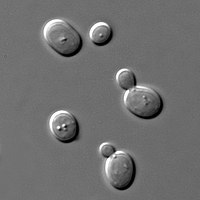
Photo from wikipedia
Regardless of the type of killer yeast, winemaking may be adversely affected by a single type of killer yeast. In this review we present the properties of a single K2… Click to show full abstract
Regardless of the type of killer yeast, winemaking may be adversely affected by a single type of killer yeast. In this review we present the properties of a single K2 strain, Saccharomyces cerevisiae T206, which was isolated from a stuck fermentation in a South African winery. This zymotidal strain has demonstrated its potential as a wine yeast antagonist and may be differentiated from other NCYC killer strains of S. cerevisiae on the basis of CHEF karyotyping and mycoviral RNA separations. Resolution of its genomic DNA into 13 chromosome bands, ranging from 0.2 to 2.2 Mb, has been reported. The resident viral-like particle in strain T206 yields pancreatic RNase-sensitive L and M double-stranded RNA species of 5.1 and 2.0 kb, respectively. The latter can be cured using cycloheximide to produce a K-R- derivative. In microscale vinifications the K2 toxin of strain T206 demonstrates a lethal effect on sensitive mesophilic wine yeasts over a narrow pH range of 3.2 to 3.5, disrupting the cell wall structure and perturbing cytoplasmic membranes. Contrary to known fermentation trends, the challenged fermentations are neither stuck nor protracted as strain T206 competes for substrates and induces over 65 % cell death in enriched Hanepoot grape juice media. Mucoid secretions of mesophilic wine yeasts, induced by nutrient limitation, appear to restrict the K2 killer effect. However, the supplementation of 1 to 100 ppm bovine submaxillary gland mucin in nutrientenriched grape juice media also depresses the K2 killer effect of strain T206 in mesophilic wine yeast starter culture strain, S. cerevisiae VIN7. Preliminary results suggest that mucoid secretions either affect the level of toxin production by strain T206 or block the cognate K2 receptor on the cell wall of challanged yeasts.
Journal Title: South African Journal of Enology and Viticulture
Year Published: 2017
Link to full text (if available)
Share on Social Media: Sign Up to like & get
recommendations!